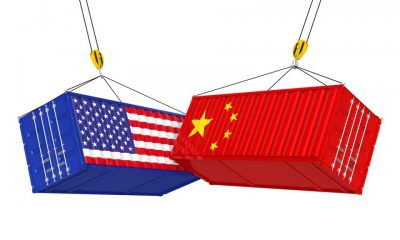Trump Regime Escalates Economic War on China

The US is a declining empire, the more aggressive and widespread its malign activities, the sooner its fall from grace will arrive. Vaunted Pentagon forces failed to defeat Taliban fighters in Afghanistan after 18 years of trying, nor Syrian resistance after nearly nine years, or Yemeni Houthis after five years.
Forty years of war on Iran by other means failed to return the country to US client state status — Trump regime economic terrorism no more successful than earlier toughness by his predecesors.
***
The US notably met its match against Russia and China, especially united. Attacking either country would be madness, assuring vast US homeland destruction and millions of casualties — perhaps turning Washington, New York, and other cities to smoldering rubble.
Trump’s economic war on China failed. Instead of normalizing relations with Beijing, he escalated toughness, making resolution of bilateral differences all the harder.
Earlier he blacklisted nearly 150 tech-related Chinese enterprises, including firms involved in producing aviation related products, semiconductors, engineering, as well as other high-tech products and components.
Claiming these enterprises act “contrary to the national security or foreign policy interests of the United States” is cover for wanting corporate America to have a leg up on Chinese competition.
Blacklisted companies are barred from purchasing US technology without Washington’s permission, tech giant Huawei and its affiliate companies most prominent on its so-called “entity list.”
On Monday, Trump’s Commerce Department added 28 Chinese public security bureaus and enterprises to its blacklist.
The action has nothing to do with alleged Chinese mistreatment of its Muslim population, everything to do with US economic war on the country, an effort doomed to fail before initiated.
The smartest US policymaking guys around are outwitted and outmatched by their Chinese counterparts, taking a longterm approach in dealings with the US and other countries.
According to the South China Morning Post, additions to the US blacklist include “the Xinjiang Uygur autonomous region People’s Government Public Security Bureau, 19 subordinate government agencies and eight commercial firms…”
Targeted enterprises include “Zhejiang Dahua Technology, IFLYTEK Co, Xiamen Meiya Pico Information Co and Yixin Science and Technology Co.”
The world’s leading human rights abuser on a global scale over a longer duration than any other nation in world history arrogantly accused China of these abuses while ignoring it own.
On October 10, Sino/US talks are set to resume in Washington after 12 failed rounds since spring 2018.
They’ll take place against the hostile backdrop of more Chinese entities added to the Trump regime’s blacklist and US tariffs on $250 billion worth of its imports scheduled to rise from 25 – 30% on October 15, policies Beijing strongly opposes.
Chances for achieving a breakthrough this time are virtually nil — because talks have nothing to with the trade imbalance favoring China.
They have everything to do with longstanding US aims to marginalize, weaken, and isolate Beijing, along with wanting its development as an economic, technological and military power undermined.
On Tuesday, China’s official People’s Daily broadsheet said upcoming talks could go three ways: reaching a “fair” deal, continuing talks “while retaliating,” or discussions achieving nothing like earlier.
“We will strive for a good outcome, but will also not force it,” the broadsheet stressed, adding:
The Trump regime continues unacceptable anti-China “maximum pressure” tactics.
Beijing readied “sufficient and appropriate” response plans if talks collapse — without further elaboration.
*
Note to readers: please click the share buttons below. Forward this article to your email lists. Crosspost on your blog site, internet forums. etc.
Award-winning author Stephen Lendman lives in Chicago. He can be reached at [email protected]. He is a Research Associate of the Centre for Research on Globalization (CRG)
His new book as editor and contributor is titled “Flashpoint in Ukraine: US Drive for Hegemony Risks WW III.”
http://www.claritypress.com/LendmanIII.html
Visit his blog site at sjlendman.blogspot.com.

